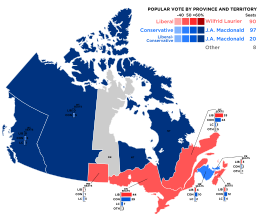Canadian General Election 1891
The 7th Canadian General Election ( English 7th Canadian General Election , French 7e élection fédérale canadienne ) was held on March 5 1,891th 215 deputies were elected the Canadian House of Commons (Engl. House of Commons , fr. Chambre des Communes ). For the fourth year in a row, won the Conservative Party of Prime Minister Sir John A. Macdonald .
The vote
The main point of contention during the election campaign was Macdonald's National Policy , a protectionist economic program designed to protect the Canadian economy from the influence of the United States . The Liberal Party, on the other hand, advocated unrestricted free trade . Once again the Conservatives and their affiliated Liberal Conservatives succeeded in gaining an absolute majority of the seats. Just three months after the election, Macdonald died of a stroke and was succeeded by John Abbott .
For the first time, Wilfrid Laurier was chairman of the Liberals. Although he lost this election, he was able to narrow the gap significantly. Five years later he won by an absolute majority and became Canada's first Francophone Prime Minister.
The turnout was 64.4%.
Results
Overall result
| Political party | Chairman | candidates data |
Seats 1887 |
Seats 1891 |
+/- | be right | Share of voters |
+/- | |
|---|---|---|---|---|---|---|---|---|---|
| Conservative Party | John Macdonald | 187 | 96 | 97 | + 1 | 332.961 | 42.96% | + 2.81% | |
| Liberal Conservative Party 1 | 25th | 26th | 20th | - 6 | 43,557 | 5.62% | - 1.64% | ||
| Liberal Party | Wilfrid Laurier | 194 | 80 | 90 | + 10 | 350,512 | 45.22% | + 2.09% | |
| Independent Conservatives | 4th | 3 | 3 | 15,045 | 1.94% | + 0.38% | |||
| Independent | 4th | 1 | 2 | + 1 | 6,357 | 0.82% | - 0.42% | ||
| Nationalists | 1 | 1 | 1 | 2 | 0.00% | - 0.66% | |||
| Independent liberals | 2 | 6th | 1 | - 5th | 5,573 | 0.72% | - 1.45% | ||
| Nationalist Conservatives | 1 | 2 | 1 | - 1 | 1,271 | 0.16% | - 0.32% | ||
| not known | 14th | 16,890 | 2.18% | - 1.15% | |||||
| Equal rights | 2 | 2,455 | 0.32% | + 0.32% | |||||
| Progressive | 2 | 468 | 0.06% | + 0.06% | |||||
| total | 436 | 215 | 215 | 775.089 | 100.0% | ||||
1 The Liberal Conservatives and the Conservatives formed a parliamentary group in the House of Commons.
2 The only nationalist candidate was elected by acclamation
Acclamations
8 MPs were elected by acclamation due to a lack of opposing candidates :
- British Columbia: 1 Conservative, 1 Liberal Conservative
- Manitoba: 1 Conservative
- Ontario: 1 Conservative
- Québec: 1 Conservative, 2 Liberals, 1 Nationalist
Result by provinces and territories
| Political party | BC | NW | MB | ON | QC | NB | NS | PE | total | ||
|---|---|---|---|---|---|---|---|---|---|---|---|
| Conservative Party | Seats | 5 | 4th | 1 | 39 | 24 | 10 | 12 | 2 | 97 | |
| Percentage ownership % | 71.6 | 81.0 | 12.6 | 42.2 | 45.4 | 48.9 | 41.9 | 48.5 | 43.0 | ||
| Liberal Conservative Party | Seats | 1 | 3 | 7th | 3 | 2 | 4th | 26th | |||
| Percentage ownership % | 40.5 | 5.3 | 3.0 | 3.7 | 10.8 | 5.6 | |||||
| Liberal Party | Seats | 1 | 44 | 33 | 4th | 5 | 3 | 90 | |||
| Percentage ownership % | 28.4 | 19.0 | 46.9 | 49.1 | 45.9 | 41.3 | 43.6 | 41.0 | 45.2 | ||
| Independent Conservatives | Seats | 1 | 2 | 3 | |||||||
| Percentage ownership % | 1.3 | 5.9 | 1.9 | ||||||||
| Independent | Seats | 1 | 1 | 2 | |||||||
| Percentage ownership % | 0.7 | 1.2 | 3.2 | 0.8 | |||||||
| Nationalists | Seats | 1 | 1 | ||||||||
| Independent liberals | Seats | 1 | 1 | ||||||||
| Percentage ownership % | 2.9 | 10.5 | 0.7 | ||||||||
| Nationalist Conservatives | Seats | 1 | 1 | ||||||||
| Percentage ownership % | 0.7 | 0.2 | |||||||||
| not known | Percentage ownership % | 2.0 | 3.8 | 3.1 | 2.2 | ||||||
| Equal rights | Percentage ownership % | 0.7 | 0.3 | ||||||||
| Progressive | Percentage ownership % | 0.5 | 0.1 | ||||||||
| Total seats | 6th | 4th | 5 | 92 | 65 | 16 | 21st | 6th | 215 | ||
Web links
- Elections Canada (Electoral Authority)
Individual evidence
- ^ Voter Turnout at Federal Elections and Referendums. Elections Canada, February 18, 2013, accessed July 4, 2015 .


